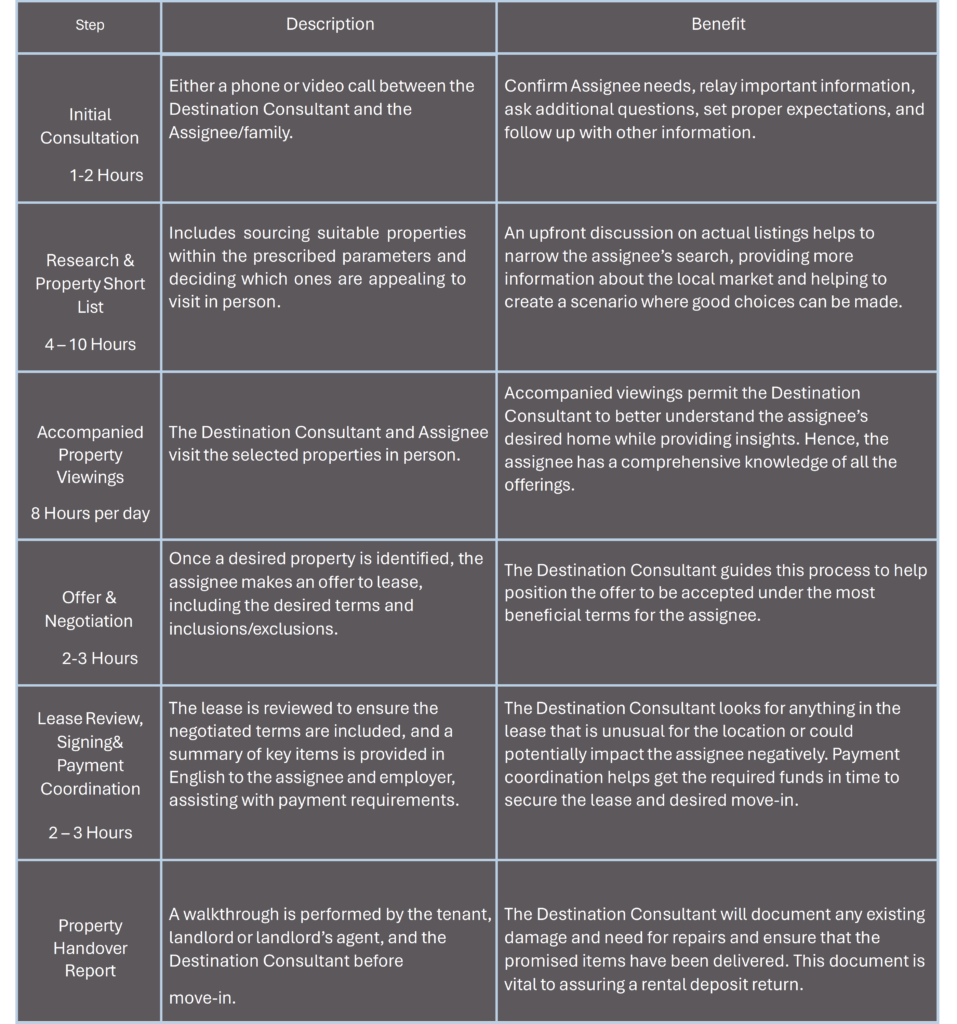The introduction of One Day DSP programs has had a negative impact all along the supply chain and to the assignee experience. Are these programs wishful thinking, or are they a new necessity that requires a better definition that once meant for a vastly different set of circumstances?
With this third installment or our five part series, we showcase the disconnect involving time, execution and expectations with one service: Home Finding.
Part III: Home Search Expectations: A Challenge to the Experience
There is no single way to deliver a home search, but a comprehensive home-finding assistance program involves basic components. These components include an initial consultation, research, property shortlisting, accompanied property viewings, offer and negotiation, lease review and signing, and move-in inspection or inventory.

Assuming a desirable property was identified within one day of viewings, the process will take at least 20 hours of work for the destination consultant team. For Relo Network Asia, this would be considered two days of service.
Note that the estimated time frames mentioned above may vary depending on market conditions and location-specific challenges. Steps involved in the process are unpredictable and may take longer. “Research and Property Shortlist” and “Property Viewings” are crucial and require careful consideration.
The process of identifying properties of interest is highly dependent on several factors outside the control of the destination consultant. Employee expectations can extend and cause the entire process to restart if they are out of alignment with the local housing situation.
Outside control of all parties involved is the availability of properties in a tight market. Markets can have low availability in general when demand outpaces supply. Still, supply shortages can also be specific to situations where a family needs a large property with several bedrooms not typical in the location or where a budget apartment is required, but the area is high cost.
The ease with which properties are sourced and verified varies by location as well. In Singapore, for example, most properties will be accurately represented online and are easily accessible to the Destination Consultant and Assignee. In Thailand, however, there are no reliable online sources for properties, and the search is more labor-intensive. Locations without strong housing laws or markets where the local language differs from the assignee’s native tongue present additional challenges.
The location and situation dictate the number of properties that can be visited in a given timeframe. Traffic issues, including congestion and smog control activities such as alternate driving days, negatively impact the ability to maximize viewing time. In cases where assignees’ interests include two or more locations or neighborhoods, despite traffic, the travel time between areas impacts the number of properties that can be seen.
Nitin Badhwar, vice president of Welcomehome Relocations serving Canada, put the situation currently faced in his diverse country into perspective, “The destination plays a huge role. Some cities may have a good concentration of rental apartments that are easy to reach in one afternoon, but that isn’t always the case. Larger families searching for single-family homes may have options spread across the city and throughout different suburbs.”
A frequent tool in the RFP process is to set a minimum number of properties to be seen. In the worst case, that could be 2 – 4 properties, or to be positive, at best, perhaps 10. But what if those 4 – 10 properties visited don’t quite match the assignee’s desired home?
The mismatch between the time it takes to deliver a Home Search service and the current trend of standalone-one day Home Search relocation benefit poses challenges in setting and managing expectations.
In an ideal situation, what the talent mobility team was buying and what the service delivery team was providing would be transparent and the same. Today, there is no consensus on precisely what will be delivered in this one day of “DSP” support. The lack of defined service parameters sets up a scenario where both talent mobility teams and destination consultants may struggle to meet expectations, leading to assignee dissatisfaction.
Who then decides how the day will be spent? Assignees, often unfamiliar with the intricacies of relocation, may not fully grasp the complexity of the process within a limited timeframe. What seems the most important at the beginning of a home search, which is a highly stressful time, may not include future thoughts such as rental deposit returns or lease clauses. Destination Consultants can only advise on the best use of time.
Rohit Kumar, founder and managing director at IKAN Relocation Services India described a situation with one client who offered 30 days of temporary housing and one day of destination support. With every program, the same problem would arise. “The assignees wanted to see more and more properties, searching to get the best bang for their buck.” said Kumar, “They were willing to look for many days, but by the time a property decision was made, our time was done.”
Some complications arise when the services provided have a specific time frame for accompaniment by the Destination Consultant. Certain organizations believe that only the services delivered in person to the assignee should be considered part of the service.
Since the pandemic, we have all been introduced to a new way of working. No company has reduced employee pay because they no longer need to commute to work on-site. The same applies to DSP companies. The destination team’s time and work are not limited to face- to-face interaction with the assignee and family. The costs to provide the support remain even if the consultant and assignee never meet. The time that can be saved is the travel time to and from locations, which can be utilized to fulfill the scope of service and compensate for the current limited benefits.
As Badhwar put it, “We have to get away from this idea of accompanied service being the only interpretation of service. Employees work from home, and we work from home”. No matter where the work is done, it is still work. We can presume the tactic is meant to ensure attentive support from the supplier. However, that can only be achieved when sufficient time and services are purchased.
What happens all too frequently with one-day programs is that the destination consultant makes up the deficit. “The Destination Consultant often starts the interaction with the assignee before arrival,” says Badhwar, “They get to know the assignee and family, and by the time of arrival, the Destination Consultant feels a responsibility to help because that is the nature of our business.” That desire to help will often lead the consultant to continue supporting the assignee at their own expense. Quite frankly, that’s not fair. “If a full Home Search is being delivered in one day, either the scope is undergoing a reduction, or someone is overdelivering,” offered Alistair Murry, COO of Packimpex, Ltd., .
Part IV of this series looks closely at just how dangerous a game these one-day DSP programs are and the accommodations made in their delivery.
PART I: A Look Back at How We Got Here
PART II: The Theory of Pricing Impact on One Day DSP Programs
PART III: Home Search Expectations: A Challenge to the Experience
PART IV: Undefined – Dangerous Games and how They’re Navigated Now




